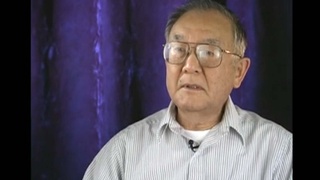Interviews
Too Ashamed to Tell
Many, many people mentioned it to me, and they said, "Gee, we didn't know what had happened to you," and you know, that's the thing. I have to tell you this. It's because when I first went to Chicago and to the University of Wisconsin, people would say, "Where are you from?" I never told them I was in camp. I was too ashamed to tell them that. And, but after this happened, of course, after the commission hearings, well, since everybody knew about it, then I was able to say, well, yeah, and describe to them what the situation was and what conditions we lived under and things like that. So it was... it kind of opened it all up for me.
I*: So you really changed a bit yourself during this whole process?
Oh, absolutely, absolutely. Yeah, it was a catharsis. Uh-huh.
*”I” indicates an interviewer (Becky Fukuda).
Date: September 11, 1997
Location: California, US
Interviewer: Becky Fukuda
Contributed by: Denshō: The Japanese American Legacy Project.









